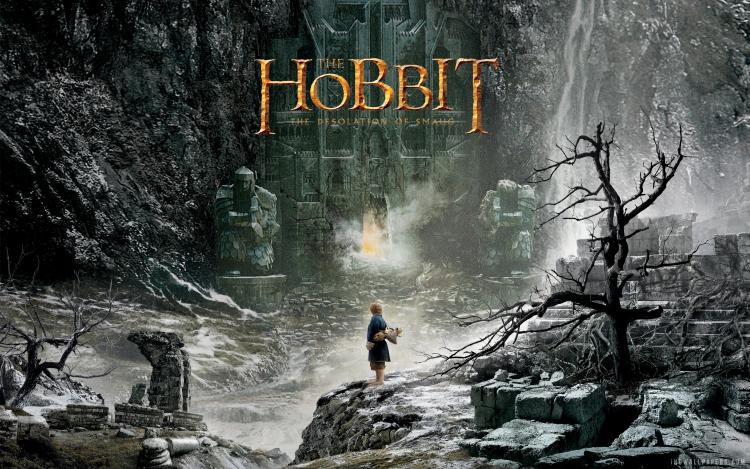You’ve heard the complaints about last year’s The Hobbit: An Unexpected Journey. It’s too long. Nothing happens. Too much CG. I can’t disagree with a lot of those sentiments but I still very much enjoyed the charm and wonder that Peter Jackson brought back to that world. The Hobbit: The Desolation of Smaug still falls prey to the prior film’s shortcomings, but continues the journey in a darker adventure that serves as an improved and entertaining mix of the old and new trilogy.
[pullquote_right]Serves much heavier as a prequel than I would have even guessed.[/pullquote_right]The biggest thing people will have trouble reconciling after their first viewing of this film will be exactly that previously mentioned element: the world of Middle-Earth is transitioning faster than fans might have expected into the darker, more complex world that the Lord of the Rings trilogy inhabited. The Hobbit: The Desolation of Smaug serves much heavier as a prequel than I would have even guessed, speeding through much of the book’s content in favor of new material.
It took me a day or two of digesting how the film plays out until I came to the conclusion that I really like how The Hobbit franchise has become this weird hybrid of the film and literary Tolkien universe. The Desolation of Smaug had to have been the most difficult to adapt from the book, especially with the film being designated to cover events after Gollum/Smeagol but before the climactic final battle of Lake-town. Essentially, the film is made to be very much a serialized installment bridge between films and less of an actual stand-alone movie, with a great deal added in an obvious effort to provide enough story for the third and final film.
One of those decisions is to bring fan favorite Legolas (an obviously older Orlando Bloom) back into the mix even though he was not part of the source material. Elves are nearly immortal, so his inclusion here isn’t implausible and he kicks some serious ass in the action scenes (the barrel escape sequence is fantastic) while having an even bigger role than some might expect. It’s against canon, but it works. Expect to see more of him in the next film as well, since the delightfully self-centered Elvenking Thranduil (the awesome Lee Pace) is his father, and there is unfinished business with the dwarves by the end of this film.
[pullquote_left]Lilly is extremely good in the role, providing a very pleasant surprise to add to the mythology. [/pullquote_left]In addition, the female elf warrior Tauriel (Evangeline Lilly) was created specifically for the film by Jackson and his writers to provide another hero and love interest for two (yes, two) characters. This idea may enrage fans, but Lilly is extremely good in the role, providing a very pleasant surprise to add to the mythology. The romance sections are a bit weak and hit a few beats already tread on in the Lord of the Rings, but none of it is all that overbearing, and Tauriel adds more than she detracts from the experience.
Martin Freeman is again a revelation as Bilbo, and if you’re wondering why it’s taken me this long to get to talking about the lead character, it’s because the movie treats him in a similar fashion. The Desolation of Smaug is much more of an ensemble film than An Unexpected Journey, and as a result he’s given some nice character moments throughout, but is certainly not the focus this time.
But Freeman does provide us with some outstanding performances in smaller sections, like the heartbreaking slow revelation on Bilbo’s face as he realizes the power of the ring after a nasty encounter with some spiders (a great edge-of-your-seat sequence). These bursts of brilliance make it easier to wait for him to take center stage in the inevitable confrontation in the film’s climax with the dragon Smaug (voiced with snarling excellence by Benedict Cumberbatch). [pullquote_right]It’s hard not to take for granted how fantastic Ian McKellen is as Gandalf.[/pullquote_right]
In similar fashion, it’s hard not to take for granted how fantastic Ian McKellen is as Gandalf, and his effortless performance continues through this film, making even the most ridiculous dialogue have weight and intention. Gandalf’s story line here is mostly fabricated to connect with the Lord of the Rings trilogy and at times is unnecessary overkill, even for the hardcore fans, making for a decent portion of the fat of the film that could have been trimmed.
[pullquote_left]The two-hour and forty-one minute run time is absolutely ludicrous.[/pullquote_left]Thorin Oakenshield (Richard Armitage) gets the award for fastest descent into becoming an unlikable character (probably intentional by script), but it hurts to have the second lead (arguably) of the first film return as such a selfish, careless jerk in this one. However, another hero does emerge with Bard the Bowman (Luke Evans), who helps the dwarves escape a tough spot, adding a dashing lead for fan girls to fawn over. Evans brings a particular old Hollywood charisma to the weary yet good-natured guide with a past connected to Smaug.
The Hobbit: The Desolation of Smaug could have been a truly great film but instead, the obvious gushing love-letter to Tolkien that is this trilogy, is once again allowed to a run too much unchecked, resulting in merely a really good film. The two-hour and forty-one minute run time is absolutely ludicrous and a shorter, leaner film would have undoubtedly helped it immensely. But if audiences have patience in the film, they will be rewarded with a stronger installment in a trilogy that is finding its legs and building momentum towards the series’ final bow in 2014.





